-
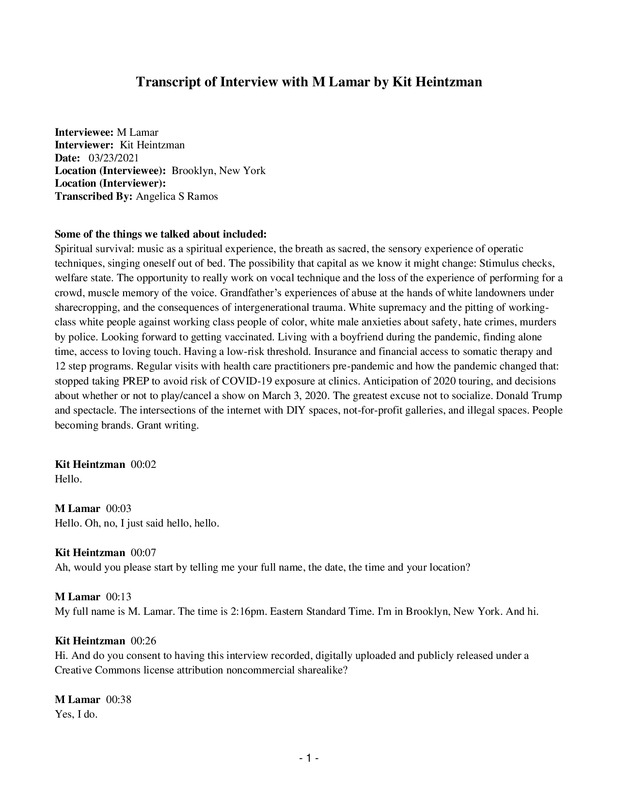
2021-03-23
Self-description: “My name is M. Lamar. I make music, primarily. I make video, film. I sometimes engage in art installation kinds of practices within art galleries and art spaces. I’m also in pre-production in two documentary films that I’m directing. A very motivating pull in my creative life for a very very long time. And so, I would love to encourage anyone who might be listening at any point in history to investigate my work. I have no faith that it will exist in 50 years, but you can find me on Spotify, Amazon Music, iTunes, all those places, YouTube. I don’t know if those places will exist in 50 years, but my work is found in all of those places. If you’re interested in a sort of... how would you describe what I do? Negrogothic music. I’m a male soprano/countertenor or a male treble voice. I play piano. I make longform pieces about any number of difficult subjects, like, say, the transatlantic slave trade or the persistence of police murder of unarmed Black people, and if you know Funeral Doom Spiritual, The Slave Ship, and Requiem Speculum Orum: Shackled to the Dead. I have a piece called Lordship Bondage The Birth of the Negro Superman which is about transcendence and spiritual awakening in the context of extreme dehumanization in the context of imperialist, western, capitalism, patriarchy. That album is a collaboration with the classical duo The Living Earth Show.”
-
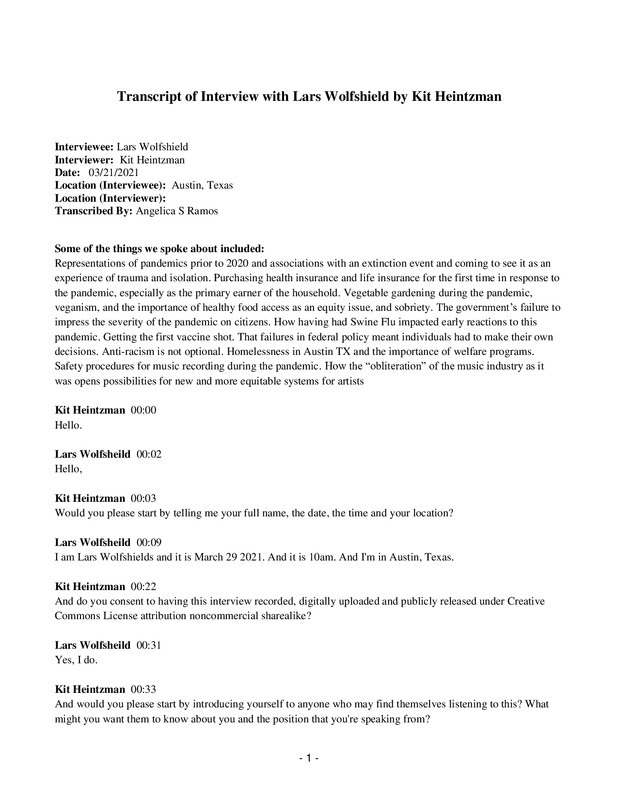
2021-03-29
Self-Description: “I am a pansexual and gender fluid artist and artist manager and I work primarily with Black and queer musicians and bands.” Record label: https://www.instagram.com/wolfshieldrecords/
-
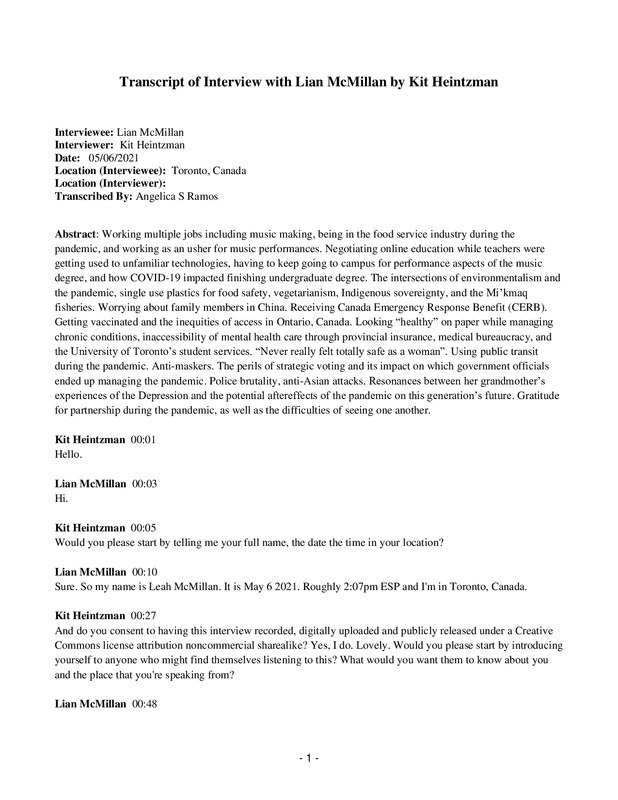
2021-05-06
Self Description: “I’m a 21-year-old musician. I just recently graduated from U[niversity] of T[oronto] a week ago, and I graduated with a classical percussion degree. I play for a band called cutsleeve. We’re a group of east Asian, queer sound musicians. I’m a mixed race woman, my father is white, and my mother is Chinese. I’ve lived in Canada, the [United] States, and I lived in Shanghai for a few years. I’m a dog owner.”
-
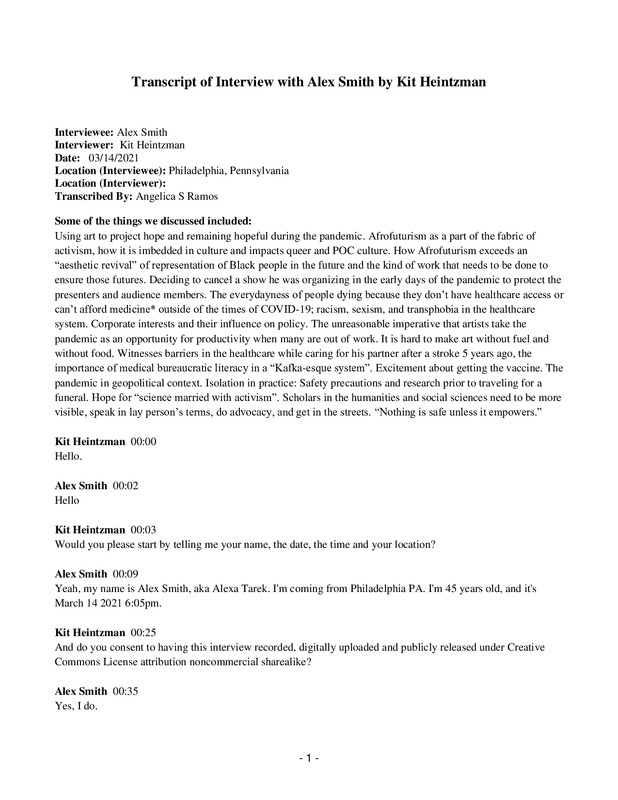
2021-03-14
Self-description: “I’m an artist, writer, musician, and an off-and-on again activist, lecturer, worshopshop leader. I’m coming out of Philadelphia. My work revolves around concepts relating to Afrofuturism; for lack of a better term: superheroes and the conceptual nature of superheroes and the idea of the vigilante and the people’s champions and heroes can walk among us. I use [aesthetics and the immersive ideas of] from science fiction, cyberpunk, solarpunk, biopunk, and Afrofurturism to empower people of color, queer people and to project us into the future and our ideas and culture into the future as well. I use different mediums to do that, my bands Solarized (a sort of noisy punk rock band) and Rainbow Crimes (indie rock, but a little crazier and noisier than many excursions into that). I have written a short story collection called ARKDUST. And I do collage work and soundscapes and curate events like Laser Life, which was a queer sci-fi reading that me and my friends in a collective that I’m in called Metropolarity put together. That’s my praxis right now: a little bit of everything. I view my work as if I’m creating for 18 or 19 or 20 year old Alex, who probably needed some queer Black sci-fi in his life. So, I’m projecting these aspects of myself back to the past to not just nourish my community, but to nourish myself.”
Personal website: alexoteric.com
Other biographical details: Vegetarian, experiences depression, Pew Center for the Arts Fellow, during COVID is the first time in his life he’s had Health Insurance.
Some of our discussion touched on:
Using art to project hope and remaining hopeful during the pandemic.
Afrofuturism as a part of the fabric of activism, how it is imbedded in culture and impacts queer and POC culture. How Afrofuturism exceeds an “aesthetic revival” of representation of Black people in the future and the kind of work that needs to be done to ensure those futures.
Deciding to cancel a show he was organizing in the early days of the pandemic to protect the presenters and audience members.
The everydayness of people dying because they don’t have healthcare access or can’t afford medicine* outside of the times of COVID-19; racism, sexism, and transphobia in the healthcare system.Corporate interests and their influence on policy.
The unreasonable imperative that artists take the pandemic as an opportunity for productivity when many are out of work. It is hard to make art without fuel and without food.
Witnesses barriers in the healthcare while caring for his partner after a stroke 5 years ago, the importance of medical bureaucratic literacy in a “Kafka-esque system”.
Excitement about getting the vaccine.
The pandemic in geopolitical context.
Isolation in practice: Safety precautions and research prior to traveling for a funeral.
Hope for “science married with activism”.
Scholars in the humanities and social sciences need to be more visible, speak in lay person’s terms, do advocacy, and get in the streets.
“Nothing is safe unless it empowers.”
Other cultural references: Netflix, Zombie Movies, Sabrina the Teenage Witch, Oprah’s interview with Meghan Markle and Prince Harry, Black Panther, Teenage Bounty Hunter, Elon Musk, GoFundMe.
A specific reference is made to the need for his sister’s sickle cell anemia medicine in this interview. She dies a few months later. The GoFundMe to cover funeral expenses can be found here: https://www.gofundme.com/f/memorial-fund-for-elizabeth-graham?utm_campaign=p_cp_url&utm_medium=os&utm_source=customer
-
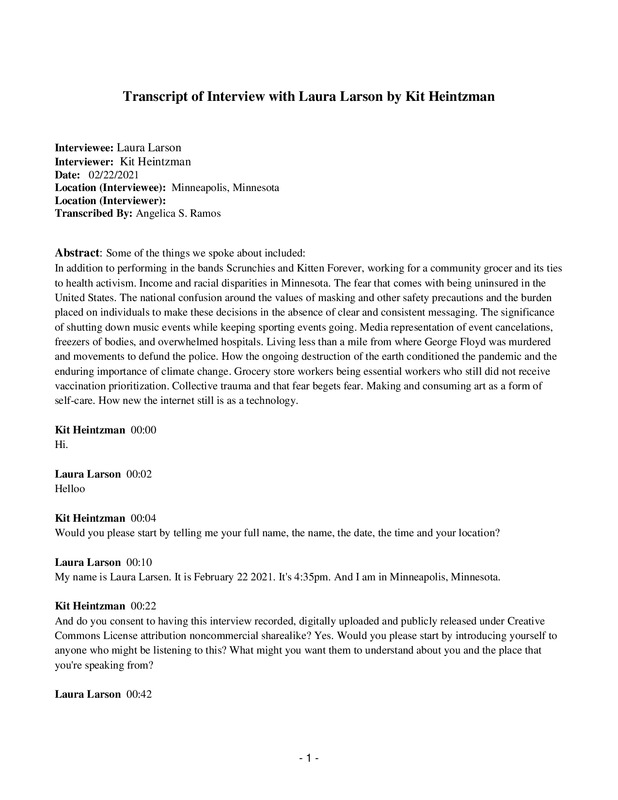
2021-02-21
Self description: “My name is Laura, and I am in two bands right now. I am in a band called Scrunchies and a band called Kitten Forever. I play guitar, base, drums, and I sing in those two bands. I live in Minneapolis, Minnesota. For work, I work at a community cooperative grocery store, in an administrative position, but one that is community outreach based and have a lot to do with meeting and coordinating with our community partners, a lot of the work that I do is about mutual aid, and helping out the community with the resources that we have available to us. Besides that I am a visual artist, I like to paint, I like to draw, I like to read books, and I live in a little duplex with my partner and our cat Sissy.”
Some of the things we spoke about included:
- In addition to performing in the bands Scrunchies and Kitten Forever, working for a community grocer and its ties to health activism.
- Income and racial disparities in Minnesota.
- The fear that comes with being uninsured in the United States.
- The national confusion around the values of masking and other safety precautions and the burden placed on individuals to make these decisions in the absence of clear and consistent messaging.
- The significance of shutting down music events while keeping sporting events going.
- Media representation of event cancelations, freezers of bodies, and overwhelmed hospitals.
- Living less than a mile from where George Floyd was murdered and movements to defund the police.
- How the ongoing destruction of the earth conditioned the pandemic and the enduring importance of climate change.
- Grocery store workers being essential workers who still did not receive vaccination prioritization.
- Collective trauma and that fear begets fear.
- Making and consuming art as a form of self-care.
- How new the internet still is as a technology.
Cultural references: Save Our Stages, The Atlantic article “Cancel Everything”.
See also:
https://scrunchies.bandcamp.com/
https://kittenforever.bandcamp.com
-
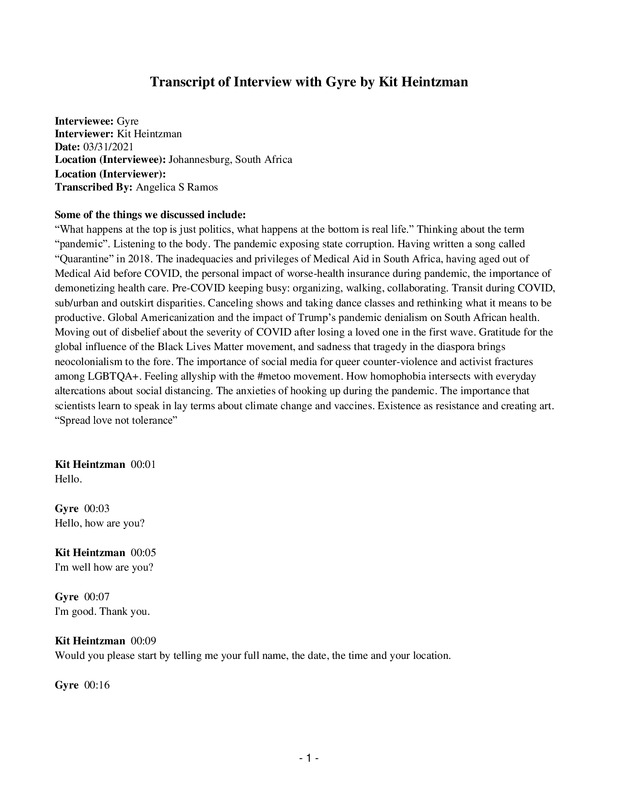
2021-03-31
Self-Description: “My name is Gyre. I am a multidisciplinary artist based in South Africa with global ambitions. I specialize in music, but I also work as a freelance writer as well as in dance. I’m a dancer learning to choreograph. Political commentator, particularity with regard to the LBGTQA+ community. I identify as queer. I am homoromatic and homosexual at this point in my life. You never know honey, it’s a spectrum. I had my first venture into artistic expression that is rooted in queer rights and queer understanding and queer theory, was my debut album, titled Queernomics, which was a documented audio-visual book about the contemporary experiences of a Black queer South African male, and that has gotten me into the positions that I express myself in, both out of passion and out of profession. Inkosi Yenkonkoni, which means “The Gay King”, in my native language which is Zulu.”
Other details available here:
Works produced during the pandemic: Kithi, International LGBTQ+ Rights Festival, writing on football.
Some of the things we spoke about included:
“What happens at the top is just politics, what happens at the bottom is real life.”
Thinking about the term “pandemic”
Listening to the body
The pandemic exposing state corruption
Having written a song called “Quarantine” in 2018
The inadequacies and privileges of Medical Aid in South Africa, having aged out of Medical Aid before COVID, the personal impact of worse-health insurance during pandemic, the importance of demonetizing health care
Pre-COVID keeping busy: organizing, walking, collaborating
Transit during COVID, sub/urban and outskirt disparities
Canceling shows and taking dance classes and rethinking what it means to be productive
Global Americanization and the impact of Trump’s pandemic denialism on South African health
Moving out of disbelief about the severity of COVID after losing a loved one in the first wave
Gratitude for the global influence of the Black Lives Matter movement, and sadness that tragedy in the diaspora brings neocolonialism to the fore
The importance of social media for queer counter-violence and activist fractures among LGBTQA+
Feeling allyship with the #metoo movement
How homophobia intersects with everyday altercations about social distancing
The anxieties of hooking up during the pandemic
The importance that scientists learn to speak in lay terms about climate change and vaccines
Existence as resistance and creating art
“Spread love not tolerance”
Other cultural references include: Trans Day of Visibility, astrology, and the TV series Pose.
-
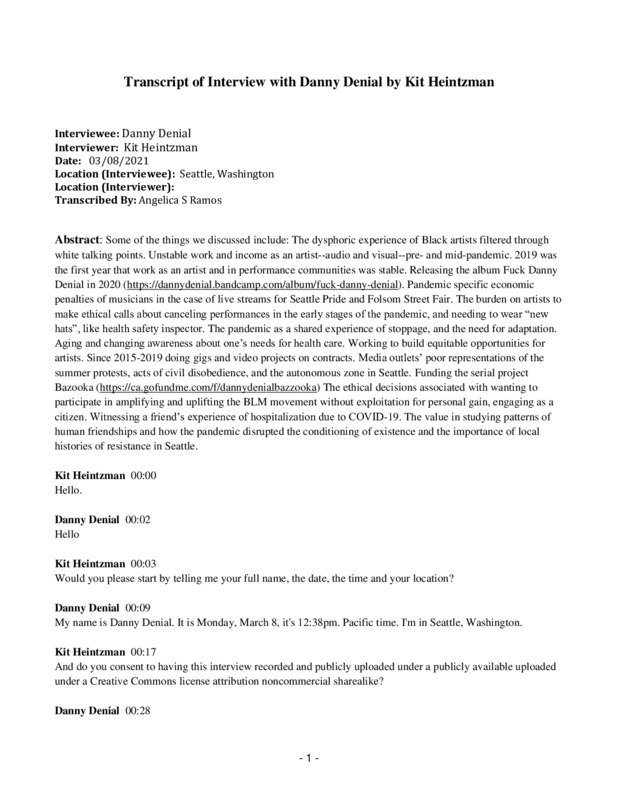
2021-03-08T12:38
Self-description: “Audio visual artist that lives in Seattle, Washington, specifically in the realm of music and film, and also the intersection of the two. A lot of my work involves amplifying experiences and voices that are often underrepresented, primarily in the Black and LBGTQ+ community. And that’s something that overtime my work has been diving deeper and deeper into over the years, which is something that I think as an artist, I’ve only really come to terms with in the last few years. But it’s been definitely both empowering for me and illuminating to see it reflected back in the ways that people have responded to the work.” Other biographical details: late 20s, from Los Angeles.
Some of the things we discussed include:
The dysphoric experience of Black artists filtered through white talking points.
Unstable work and income as an artist--audio and visual--pre- and mid-pandemic. 2019 was the first year that work as an artist and in performance communities was stable. Releasing the album Fuck Danny Denial in 2020 (https://dannydenial.bandcamp.com/album/fuck-danny-denial).
Pandemic specific economic penalties of musicians in the case of live streams for Seattle Pride and Folsom Street Fair.
The burden on artists to make ethical calls about canceling performances in the early stages of the pandemic, and needing to wear “new hats”, like health safety inspector.
The pandemic as a shared experience of stoppage, and the need for adaptation.
Aging and changing awareness about one’s needs for health care.
Working to build equitable opportunities for artists. Since 2015-2019 doing gigs and video projects on contracts.
Media outlets’ poor representations of the summer protests, acts of civil disobedience, and the autonomous zone in Seattle.
Funding the serial project Bazooka (http://web.archive.org/web/20210622155802/https://ca.gofundme.com/f/dannydenialbazzooka)
The ethical decisions associated with wanting to participate in amplifying and uplifting the BLM movement without exploitation for personal gain, engaging as a citizen.
Witnessing a friend’s experience of hospitalization due to COVID-19.
The value in studying patterns of human friendships and how the pandemic disrupted the conditioning of existence and the importance of local histories of resistance in Seattle.
Cultural references: Pan’s Labyrinth, Smash Mouth’s super spreader event, Portland International Film Festival, The Tape Deck Podcast, Punk Black, Darksmith, Taco Cat, Alice and Chains, Duff McKagan, Pearl Jam, MoPOP, Shaina Shepherd, and TheBlackTones.
-
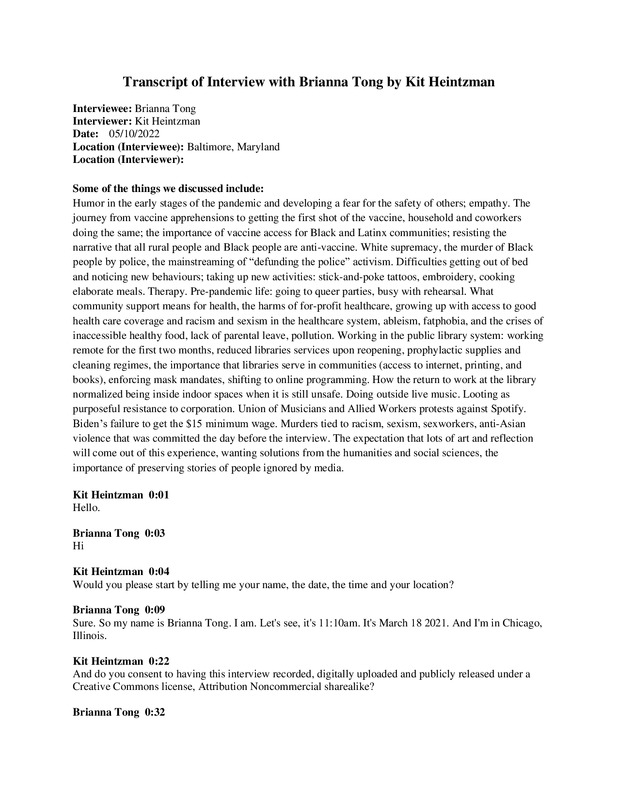
2021-03-18
Self description: “I am sitting in my bed right now as I’ve done for a lot of this quarantine. In regular times and I guess still now, I’m in three bands and I also work at the library, the public library. So I’ve been working there in person since we came back to work in May. I was contacted for this interview through Bussy Kween Power Trip, which is a Black queer punk band with three people, no guitars, so my close friends. I’m in two other bands. One band is called Je’raf and one is called Cordoba. And one person each from Bussy Kween is in each of those bands. Haven’t played a show in forever. I can give a little about what I look like or am like. I’m a woman. I’m 26, almost 27 I guess. I’m Black and Asian. I’m kinda short. And during this pandemic I’ve been in general super lucky to have a job still and a great living situation. And I met my partner right before the pandemic, so we’ve been chilling a lot and that’s been amazing. She is so great. Yeah, just going to work and working on all kinds of things in my home. And sometimes having the energy to do a bunch of music and crafts and other art things, and sometimes laying in bed for a full day.”
 2021-03-23
2021-03-23 2021-03-29
2021-03-29 2021-05-06
2021-05-06 2021-03-14
2021-03-14 2021-02-21
2021-02-21 2021-03-31
2021-03-31 2021-03-08T12:38
2021-03-08T12:38 2021-03-18
2021-03-18